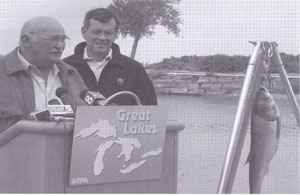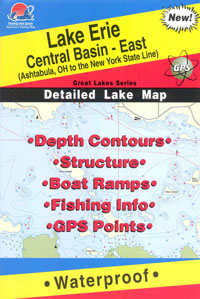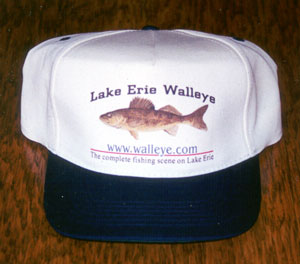|
Asian Carp Barrier Spending Approve!
Ohio Senators, George Voinovich and Mike DeWine and Rep. David Hobson
were instrumental in putting an extra $1.825 million in a 2005
District of Columbia spending bill to enhance and finish the new electric barrier fence on the
Chicago Sanitary & Ship Canal. President George W. Bush is expected to
sign the bill.
bill to enhance and finish the new electric barrier fence on the
Chicago Sanitary & Ship Canal. President George W. Bush is expected to
sign the bill.
Present at the announcement were Ohio Senator George Voinovich, Ohio
Senator Mike DeWine, EPA Administrator Mike Leavitt, Ohio director of
the Dept. of Natural Resources Sam Speck, U.S. Army Corps of Engineers
Co!. Johnson, LECBA President Robert Collins and Michael Matta advisory
board member of the Great Lakes Fishery Commission.
Collins said "The 850 plus Ohio Charter Captains, members of the LECBA
and the 100's of thousands of Ohioans that enjoy the lake would be
negatively affected if these carp got in and disrupted the walleye,
perch, and smallmouth bass fishing that are so important to us."
"This Asian Carp Barrier, for the first time I can recall, will prevent
the invasion of a foreign species into the great lakes. Asian Carp could
wreck the $4.5 billion Great Lakes fishing and recreation industry if
they get in to Lake Erie and other great Lakes." Collins added.
The species threatening the Great Lakes are called Asian carp to
differentiate them from the common carp.
1. Silver carp, which can reach 60 pounds.
2. Bighead carp, which can top 100 pounds.
3. Black carp, escaped in the 1990's.
The western end of Lake Erie, between Monroe and Sandusky, is the
shallowest, warmest, and most-prolific area of the Great Lakes for fish
spawning. Much of the local Lake Erie tourism is based around the
sportfishing industry.
The Lake Erie resource is important to Ohio, the counties along the
north shore, and specifically to the charter and other
recreation-related businesses. It has been for a long time and we need
to ensure that fishing remains a viable activity for a long time to
come.
It is really great to see the timely support for actions that will
prevent nuisance species from coming to the Great Lakes. Once they are
here it is nearly impossible to control them. Sea Lamprey invasions
devastated fisheries in the last century and we now pay the price for
control measures every year.
Even though not every exotic species is harmful, we can't afford to take
the risk and let them invade our lakes and rivers. Fishing is a risky
enough business and fishermen don't need the added worry of having
exotics upset the food chain and ruin good, healthy fisheries.
Unlike some other environmental problems, aquatic nuisance species
introductions are usually permanent! We can't clean them up like an oil
spill.
Government at all levels are involved in this fight to prevent Asian
carp from getting into the Great Lakes. The charter industry
appreciates the collective efforts of city (Chicago), state, and,
federal governments on this one! That is what it is going to take to win
this battle.
Reprinted from volume 2 issue 23 of "Charter
Chatter", courtesy of LECBA. |




 bill to enhance and finish the new electric barrier fence on the
Chicago Sanitary & Ship Canal. President George W. Bush is expected to
sign the bill.
bill to enhance and finish the new electric barrier fence on the
Chicago Sanitary & Ship Canal. President George W. Bush is expected to
sign the bill.